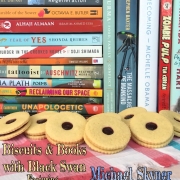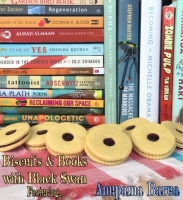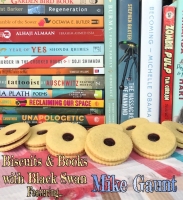Biscuits and Books with Black Swan 05 – Michael Skyner
Michael Skyner is author to multiple titles: The Monkey’s Fart, a children’s poetry book; Chris Clotbo, a dyslexia friendly adventure book, Blatherington Hall, a spooky story; Space Nutz, a young adult sci fi and the up and coming Spirit Wolf.
Michael, who is dyslexic himself, succeeds in showing his younger readers that reading and writing with dyslexia can not only be possible – but be so fun!
I was so exciting to throw a bunch of questions at him, this is how our chat went.

BSBP: I suppose a good place to begin is when and why did you start writing?
MS: I was living in the countryside developing a wildlife sanctuary but unfortunately had to give it up. When we moved house, I gave myself a challenge, to write , paint, or play guitar. Writing won, although I have learnt some rudimentary illustrations and play classical guitar badly.
BSBP: ‘The Monkey’s Fart’ is a poetry book that touches on your personal relationship with Dyslexia. My favourite poem from the book is ‘My Left Brain’, which must be nice for a Dyslexic person to read and feel seen, as well as offering an insight to those who do not have Dyslexia. Was this your goal?
MS: Definitely, I wrote the book with dyslexic children and children with learning difficulties in mind. It also had to be fun and encourage children to write their own poetry, hence the teach yourself section at the back. I think it would make a good textbook in expanded form as it was well received by schools and teachers who said it helped them introduce poetry to kids who otherwise would not be interested. It was supported by Dyslexia Action and Waterstones. I think it would make a great textbook but am not sure how to go about it.
BSBP: And, what’s your favourite poem from the book? If you can choose, of course.
MS: For me it has to be Poly Polynesia. I love the way the alliteration works, and the poem looks great with Nicola’s illustration of the Skeletal Poly.
BSBP: The poem ‘The Bully’ is unfortunately all too relatable for far too many. But the poem does have an insightful and important message about bullies merely projecting their own hurt. What inspired this poem? What words of comfort could you give to someone being bullied?
MS: While working as a school counsellor I came across many instances of children who were being bullied mainly because they were different. Particularly the LGBT+ children. But bullies do not discriminate and will pick on anyone they consider weak. My own experience growing up in one of the toughest estates in North London reminds me of how nightmarish bullying can be. Bullies are often the result of being bullied themselves at home, often, but not always, by dominant fathers. They are to be pitied.
BSBP: ‘Space Nutz’ is an especially humorous work of yours, I find. It’s very cheeky in its delivery. What inspires such an original and – I do mean this kindly – weird idea?
MS: Goodness knows. Thanks to my father I’ve inherited a quirky humour. When Space Nutz was ‘sent’ to me one day standing in the kitchen I had no idea how the book would pan out. It has undergone many changes over the years. People talk of developing your own voice as a writer. I often wondered how to do this. As time went on and my writing progressed, I noticed a certain style emerging. My voice I suppose.
BSBP: The novel is also an inspiration to those with Dyslexia, they may never have thought that they could write such a complex, lengthy piece of work. What helped you? Let’s have the 3 top tips to making writing manageable.
MS: These crazy characters kept forming in my head. I spent two weeks just jotting down who they were. Then, the flood gates opened and after a year I ended up with an opus of one hundred and ninety thousand words. It was only possible due to technology. I could never have achieved this if I had to write by hand.
Top tip 1 Keep your writing simple.
Top tip 2 Keep focused, dyslexics are too easily distracted.
Top tip 3 Write one brilliant novel, publish it then write a sequel.
If only I had followed the advice!
BSBP: And, 3 top tips for reading with Dyslexia?
MS: 1. Read with someone.
2. Listen to audio books.
3. Challenge yourself to read slightly above your current reading level and read something you love.
BSBP: As well as being comically charged in your tone of work, you have a real flair for suspense and creating an unnerving atmosphere. I’m thinking of ‘Spirit Wolf’ and ‘Blatherington Hall’ specifically here. Are you a horror fan?
MS: I used to watch horror movies in the 1970s – showing my age- particularly enjoyed Roald Dahl’s Tales of the unexpected. Not really a horror fan today. Blatherington Hall was meant to be a bit of fun and isn’t too scary, but Spirit Wolf is something else. Again, another example of a story being ‘sent’. Other writers will know what I mean by that. One of my proof-readers said that the ending was really clever. I asked her what she meant. I hadn’t even spotted it. Strange. In fact, the whole story behind Spirit Wolf would make most people’s back of the hair stand up. But that’s another story in itself.
BSBP: ‘Chris Clotbo and the Conquest of the Americas’ is labelled ‘Dyslexia friendly’ on its back cover. What makes a book dyslexia friendly?
MS: In the past I have used cream coloured paper and dyslexia friendly fonts to make my stories readable for children with dyslexia. Normal print can often jump about for dyslexics so a font that is already jumbled is easier to read for some. I also have dyslexic readers and simplify some of the words but not all. My personal experience is that it’s better to challenge yourself and read slightly above your current reading level. Lately, I have changed to using a simple to read font: Times or Cambria, even Arial which most dyslexics do not seem to have an issue with. Plain is best?
BSBP: All of your books are so different in subject matter, but all share the same Skyner touch. What could possibly be next to look forward to?
MS: Currently working on a number of stories for children. One is a fantasy adventure called Troll Mania and is turning out to be an epic work. Basically, good versus evil, but with a twist. Another is called Monster Hill which is about how we are polluting the planet and ourselves. I am also excited about another story which is set in Kenya and London called Yolonde and the Magic Slippers. Yolonde dreams about becoming a famous dancer, just one problem, she cannot dance until she discovers some magic slippers in a shop and with the help of a dancing lion and the moon, she overcomes her difficulties and achieves her dream, only to give it all up for love.
BSBP: Your work building imagery, I’m thinking of ‘Space Nutz’ myself right now, is so flamboyant. I think it would work so well in visual media (TV perhaps). Have you ever considered this at all?
MS: You are not the first to have mentioned this. How one goes about it I simply don’t know. Traditionally published works are eligible for competitions which self-published works are not, and this often leads to the offer of TV and series rights. As I write this, I’m thinking of a twenty something author in London who has been offered a million-pound advance for two books plus a series on Netflix, all within eighteen months of publication. On the other hand, I am continuously improving and upgrading my work, which is something one cannot do with a traditionally published book.
BSBP: To conclude, are you writing or reading anything right now?
MS: Currently reading Jack Winter, the boy who flies a UFO, by TC Ashforth. A brilliantly conceived yet simple idea of a boy who flies an anti-gravity flying machine built by his scientist father. Well written, easy to read for kids, fantastic attention to detail. Suspenseful. The sort of book I would love to write but know I never will. We were talking about film and TV rights earlier, well, this would make a blockbuster. Why it was not traditionally published I don’t know. Then again, as a manager of Waterstones remarked, many self-published books are superior to much of what is published today. And many authors choose to go down the self-publishing route as a first choice.
We couldn’t recommend these books enough, especially to children and young adults who may be experiencing difficulty reading. Thanks to Michael for spending this time chatting with us!
Where to find Michael Skyner:
Website: www.mikeskyner.co.uk
Twitter: @mikeskyner
Where to find his books:




Leave a Reply
Want to join the discussion?Feel free to contribute!